Summary | Excerpt | Reviews | Beyond the book | Read-Alikes | Genres & Themes | Author Bio

The Afterlives of China's Cultural Revolution
by Tania BraniganTania Branigan's Red Memory is an astounding and often harrowing study of Mao's China. A lead writer for The Guardian, Branigan spent seven years in China as a foreign correspondent. Her experiences there led her to embark on a project recording people's memories from the time of the Cultural Revolution, a dark period in the country's history when the nation turned on itself. Despite the devastating impact of the events of this era and their outsized importance in understanding the political and social psychology of China today, memories of the Cultural Revolution remain taboo. Contemporary Communist Party officials have repressed mention of it in museums and history books, reforming the historical narrative into "a gentler, happier tale of historical inevitability under the Party's benign leadership." Many citizens are equally reluctant to relive the era, as acknowledging and processing the trauma they experienced can also mean facing up to their own participation in the horrors that unfolded.
What Branigan has achieved is no mean feat. Through a series of interviews with people who experienced the Cultural Revolution first-hand, she preserves the reality of one of the darkest and yet most elusive chapters in China's recent past. Branigan combines the interviews with scholarly analysis, tying individual memories to the larger movements of history that enfold them. She also reflects on how the figure of Mao continues to cast a shadow over the present-day Communist Party. Overall, it's a fascinating portrayal of a nation at war with its own history. The events of the Cultural Revolution continue to divide Chinese society; fear, nostalgia, and guilt are felt in equal parts. Branigan captures this complex psychology with a narrative voice that is clear, poetic, and urgent.
The interview sections of the book are personal and intimate. Rather than big-picture history, it's history from the ground. Her subjects are varied; some were attracted to the Chinese Communist Party via parental lineage, others by their own youthful idealism. Most were teenagers during the 1960s, when the events of the Cultural Revolution took place. As each recounts their memories, the line between victim and perpetrator shifts and blurs – those initially drawn to the Red Guards by genuine belief in their cause find themselves witnessing beatings, or being beaten themselves. One thing that struck me was the naivety that comes through in many of their early memories of Party membership; there's a sense of individuals swept up in larger forces of history, over which they could have no foresight or control. This is a credit to Branigan's narrative style, which humanizes its subjects without denying their responsibility. The book is flinty-eyed about China's leadership, both old and new. But its attitude towards the people is different – though there's no absolution, it reflects the deep confusion and dystopian horror of what they went through.
Branigan's analysis of current political leadership in China is equally compelling. As she recounts, the present-day Communist Party can't criticize Mao without destabilizing its own mythology. The Road to Rejuvenation exhibition at the National Museum in Beijing presents a grand historical narrative in which the Communist Party liberated China from its imperial past and foreign oppressors, restoring its former glory and turning it into a global superpower. A recognition of the atrocities of the Cultural Revolution would upend this narrative, and so it must be repressed. As Branigan writes, "The truth is what the Party says, it is what the Party chooses to remember." This legacy of censorship continues under the leadership of current President Xi Jinping, who, despite serving seven years of hard labor in exile following his father's purge from the Party during Mao's reign, maintains Mao's portrait in Tiananmen Square.
As Branigan is careful to point out, China is not unique in whitewashing undesirable aspects of its history. Western nations routinely downplay the centuries of imperialism, slavery and exploitation that are the foundations of their modern wealth and security. Yet, as Branigan also poignantly notes, Western forgetfulness comes easier. Citizens of Western nations often have the luxury of being somewhere far away from the source of their most shameful barbarities, which were carried out abroad (though of course there are exceptions). As fewer people witnessed or participated in the atrocities first-hand, they are more easily swept under the rug. The enforced repression of the past in China is in part due to the impossibility of such ignorance. The victims of the Cultural Revolution weren't strangers, but neighbors and family. The perpetrators were too. Everyone was caught up in the violence – there is no way of minimizing it, or of pretending that it was somehow ultimately a force for good (in the way that the British, sometimes, think of the empire in terms of railroads, Shakespeare and cricket). As Branigan writes, "We had chosen not to look, but the Chinese had to pretend they had not seen, a far harder task."
![]() This review was originally published in The BookBrowse Review in June 2023, and has been updated for the
July 2024 edition.
Click here to go to this issue.
This review was originally published in The BookBrowse Review in June 2023, and has been updated for the
July 2024 edition.
Click here to go to this issue.

If you liked Red Memory, try these:

Waiting to Be Arrested at Night
by Tahir Hamut Izgil
Published 2024
A poet's account of one of the world's most urgent humanitarian crises, and a harrowing tale of a family's escape from genocide

by Kai Strittmatter
Published 2021
Hailed as a masterwork of reporting and analysis, and based on decades of research within China, We Have Been Harmonized, by award-winning correspondent Kai Strittmatter, offers a groundbreaking look at how the internet and high tech have allowed China to create the largest and most effective surveillance state in history.
Your guide toexceptional books
BookBrowse seeks out and recommends the best in contemporary fiction and nonfiction—books that not only engage and entertain but also deepen our understanding of ourselves and the world around us.